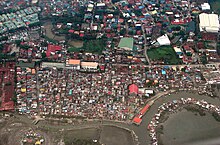Housing inequality
[1] The term may apply regionally (across a geographic area), temporally (between one generation and the next) or culturally (between groups with different racial or social backgrounds).[5] According to economist and philosopher Amartya Sen, an individual's freedoms (or capabilities) are significant indicators of the kind of life they value or have a reason to value.[citation needed] Sociologist John Milton Yinger[7] describes urban residential inequality as a result of housing-market forces.Because poorer families often cannot afford to pay transportation costs, they may be forced to live in inner-city locations closer to employment opportunities.According to Shapiro and Kenty-Drane, historical and social obstacles (slavery and racial segregation) have prevented African Americans from securing and accumulating assets Including quality housing).[citation needed] A valiant effort to guide the country’s deteriorating housing market amid the Great Depression, the (HOLC) ‘Home Owners’ Loan Corporation’ was founded in 1933 by President Roosevelt.[15] The decrease in income and the increase in rent prices leads to double precarity, which causes housing and employment insecurity.The number of homeowners is decreasing with the constant soaring of rent and down payments and the inability to save enough to transition from a renter to a home buyer.[18] Once the eviction moratorium was lifted, a lot of people lost their homes and had to relocate into different areas in search of jobs.The effects of housing inequality directly influence generational wealth, residually reducing financial opportunities and well-being for families across different age groups.Establish a federal postal bank that provides access to low-cost, low-risk financial services to Black households.Employers can benefit from advocating for and investing in affordable housing policies and programs, which can be beneficial for their workforce and the local economy.[27] According to the Pew Research Center, approximately 63% of American adults[28] living in urban areas stated that the diminished availability of affordable housing is a major issue in their community.Although the focus of housing inequality has changed with time, contemporary international analyses tend to center on urbanization and the move to metropolitan areas.A 2007 UN-HABITAT[30] report estimated that over one billion people worldwide lived in slums at the time, a figure expected to double by 2030.
Manilaeconomic inequalityright to housingfamilygenerationsocialwealth inequalitymarket forcesdiscriminationsegregationpovertyAmartya Senhuman capabilitiesJohn Milton Yingercannot afford to pay transportation costsinner-cityThomas Shapirowealth gaps between African Americans and other groupsracial discriminationRedlining(HOLC) ‘Home Owners’ Loan Corporation’President RooseveltIncome inequalityCOVID-19 PandemicFederal Eviction Moratoriumsocial networksair pollutioncrime ratespatial competitionrentinghousehold wealthWealth Accumulationracial wealth gapSubsidized housingPrivate-sector housingFair-lending enforcementScattered-site housingInvestment in local school systemsRuel Hamiltonripple effectLand value taxprogressive taxurbanizationslum upgradingReal Estate ApprasialsEffects of economic inequalityHomelessnessHousing discrimination in the United StatesReal estate bubbleCiteSeerXBibcodeThe Guardian